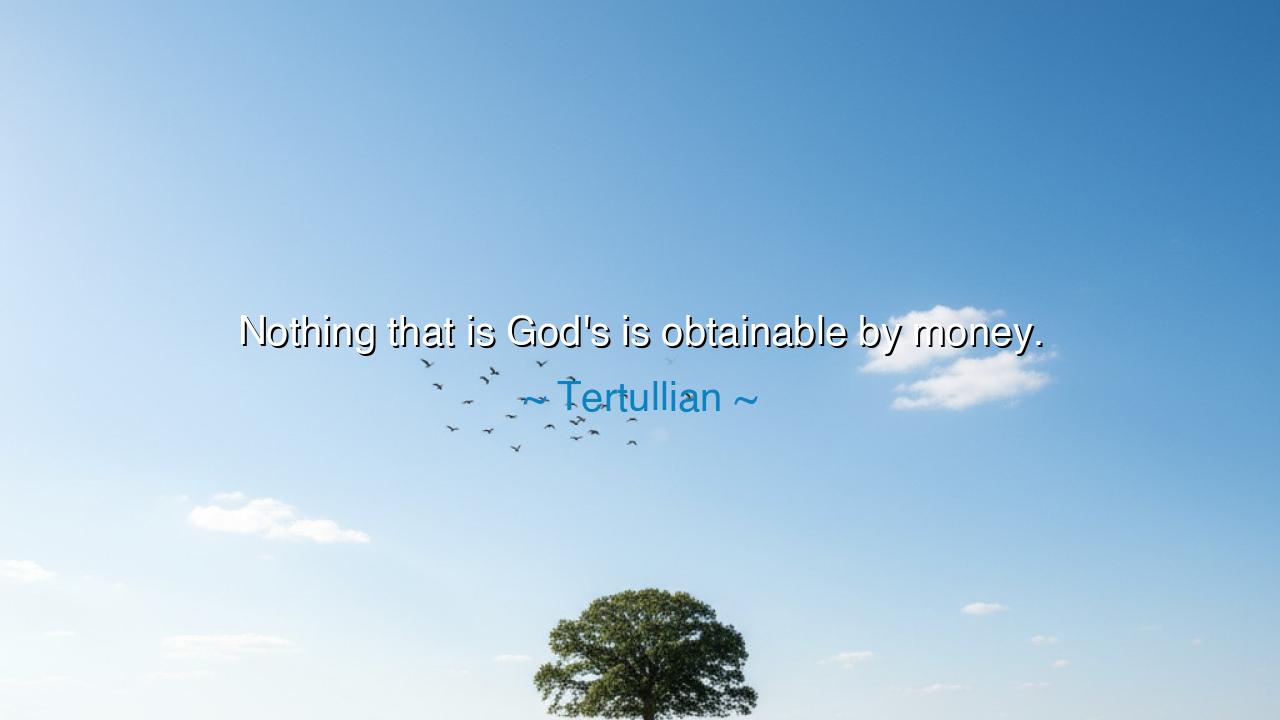
Nothing that is God's is obtainable by money.






The words of Tertullian, the fiery North African theologian of the early Christian era, resound like a hammer striking stone: “Nothing that is God’s is obtainable by money.” In this single sentence, he shatters the illusion that divine favor, virtue, or salvation can be purchased with earthly wealth. Spoken during an age when the Roman Empire worshiped gold as readily as its gods, Tertullian’s words were a defiance — a declaration that what is sacred cannot be bought, traded, or sold. The riches of heaven do not answer to the currency of men; they are measured only in faith, humility, and love.
The origin of this quote lies in Tertullian’s writings against the corruption of religious authority and the commercialization of faith in the 2nd and 3rd centuries. In his era, as Christianity began to grow and clash with Roman materialism, some sought to intertwine the divine with worldly gain. Tertullian, ever fierce in defense of purity, rebuked those who imagined that God’s grace could be purchased like land or privilege. He warned the faithful that spiritual truth belongs only to those who give of themselves, not their coin. His voice, stern and unwavering, became a torch against the darkness of hypocrisy — a reminder that holiness is earned through sacrifice, not silver.
At the heart of this teaching lies an eternal principle: the things of God are immaterial. Love, forgiveness, peace, and eternal life — these are treasures that cannot be weighed upon a scale or locked within a vault. The divine does not traffic in markets or mint its blessings in metal. It speaks to the soul, not the purse. Money may buy influence, pleasure, or illusion, but it cannot buy conscience, wisdom, or redemption. For the soul’s worth is not determined by wealth, but by its capacity for compassion and truth.
History offers countless lessons that echo Tertullian’s truth. Consider Simon Magus, the sorcerer mentioned in the Acts of the Apostles, who sought to purchase from the disciples the power of the Holy Spirit. When he offered them gold, Peter rebuked him, crying, “Thy money perish with thee, because thou hast thought that the gift of God may be purchased with money!” Simon’s greed exposed a sickness that has afflicted humankind through the ages — the belief that divine favor can be owned rather than earned. His story stands as a warning to all generations that the sacred cannot be possessed through payment, but only through purification of the heart.
Tertullian’s words also pierce the modern soul, for even in our age, mankind continues to worship wealth as if it were godlike. Many believe that money can buy safety, love, or even peace of mind — yet those who have amassed fortunes often find themselves poorer in spirit than those with nothing but faith. The peace of God, the grace of forgiveness, and the strength of righteousness remain beyond the reach of gold. The miser dies clinging to his coins, while the humble die with open hands — and it is the latter who rise renewed in the light of the divine.
The emotional power of this teaching is rooted in its reminder that God’s gifts are given, not purchased. To love, to forgive, to hope, to endure — these are the currencies of heaven. The man who shares bread with the hungry is richer than the man who hoards treasures. The woman who prays with sincerity possesses a wealth no empire can steal. In the eyes of God, every act of selflessness adds to a fortune that no thief can take, and no coin can match.
The lesson then is clear: seek not to buy what must be lived. Virtue cannot be traded; salvation cannot be auctioned. Give freely, live honestly, and measure your worth not in gold, but in goodness. Let generosity replace greed, humility conquer pride, and faith replace the hunger for control. For the moment we attempt to purchase what belongs to God, we lose sight of its true value — and in seeking to own the divine, we estrange ourselves from it.
Thus, the words of Tertullian endure like a sacred flame across centuries: “Nothing that is God’s is obtainable by money.” Let them remind you that the treasures of heaven dwell not in vaults, but in hearts; not in possessions, but in purpose. Live in such a way that when your days are done, your wealth will not be counted in coins, but in compassion — and your legacy will not rest in what you owned, but in what you gave. For only then will you have touched what is truly God’s, and known the wealth that cannot perish.






AAdministratorAdministrator
Welcome, honored guests. Please leave a comment, we will respond soon